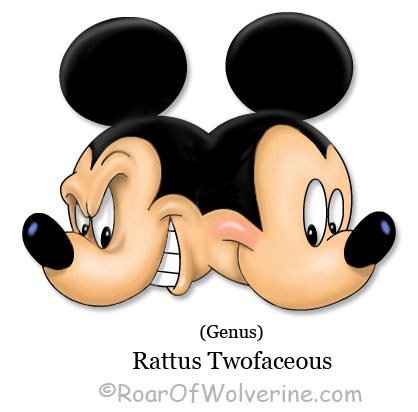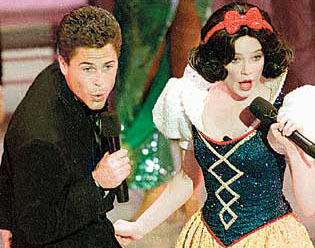The Wonderful World Of Disney Hypocrisy
 In 1998, the Copyright Term Extension Act was being debated by the U.S. Congress, which lengthened the amount of years before a copyrighted material would enter into the public domain. The law would extend the life of a copyright for works of a corporate nature from 70 years to 95 years!
In 1998, the Copyright Term Extension Act was being debated by the U.S. Congress, which lengthened the amount of years before a copyrighted material would enter into the public domain. The law would extend the life of a copyright for works of a corporate nature from 70 years to 95 years!
The law was known as the “Sonny Bono Term Extension Act”, but was pejoratively called the “Mickey Mouse Protection Act”, because The Disney Corporation was the biggest driving force behind the Lobby. Why? Because Mickey Mouse was nearing the 70 year mark and would soon enter the public domain. Many other early Disney characters would soon follow, as their copyright expiration dates were closing fast. This would be a huge financial blow to the Disney brand, so it would reason that they would lead this crusade.
Congress awarded the extension in 1998, and I’m quite sure that Disney’s 6.3 million dollars in campaign donations between 1997-1998 had no bearing on the decision. Congress overstepped its power and ruled in favor of corporate welfare rather than their sworn duty to the promotion of “progress”, as written in the Constitution Article 1, Section 8:
The Congress shall have Power… To promote the Progress of Science and useful Arts, by securing for limited Times to Authors and Inventors the exclusive Right to their respective Writings and Discoveries;
I might not have a problem with Disney’s action, had their corporation built its vast empire on originally created material. The fact that Disney used prior works as a springboard to success envelops this all in the stench of hypocrisy. The Disney company had a moderate level of success with the original characters featured in early black and white short films. Disney did not really hit stride until making full length animated features. Giving credit where due, “Fantasia” was original Disney characters and story line, if you want to call it that. “Fantasia” was literally a series of short animated stories edited together to a soundtrack made up of mostly public domain music for which Disney paid no license (with the exception of “The Rite Of Spring”).
From there on, most Disney feature animations would be based on stories that had since fallen into public domain. Snow White, Cinderella, Sleeping Beauty and many other princess stories, were based on age-old fairy tales that Disney was not required to pay license or royalties for. Later works would include children’s literature like: “Pinocchio”, “Alice in Wonderland” , “The Jungle Book” (released just one year after Kipling’s copyright expired),– All in the public domain! Disney didn’t pay a cent for story license, yet reaped many millions. The “Little Mermaid”, “Beauty and the Beast”, “Aladdin” and all features made under the reign of Michael Eisner, would be from public domain. Of course, Disney touted “The Lion King” as an original story. Not! Besides being an adaptation of Shakespeare’s “Hamlet” told through a pride of lions, there are way too many similarities between The Lion King and a 1960s Japanese animated series called “Kimba the White Lion”. Though Disney claims these a coincidence, they would sue anyone else into oblivion if they came half as close to one of their properties. The clip below illustrates just how “original” Disney’s “The Lion King” really is.
Disney has had few original productions not based on time-tested classics, and when they do, they often flopped big time. The “Aristocats” would be an example.
(Do not confuse Disney with Pixar. Pixar is the brain-child of John Lasseter and had its own talented writing staff, who penned awesome original stories. Disney was only Pixar’s distributer, until they bought them in Jan. 25, 2006. Pixar is still Lasseter’s project, with its own writers.)
Hey, Disney, have you ever heard of “sending the elevator back down”?. They built an empire off of other people’s intellectual properties and then sue daycare centers, who dare place any Disney image in the classrooms or playgrounds (real case, Hallandale, Fl, 1989). Then Disney has the audacity to purchase copyrights on the characters they liberated from the public domain. Yes, they didn’t create the characters, but they now own the iconic image that they created to represent them. Anything even remotely resembling them, they will attack with the ferocity of a pack of hyenas.
 During the airing of The Oscars in 1989, a musical skit was performed with a singing Snow White (portrayed by singer-dancer Eileen Bowman). Disney actually sued the Academy of Motion Pictures and Sciences for having a character wearing a similar wig and costume to the Disney movie version. The character named Snow White has origins as far back as the middle ages, yet Disney thinks they now own her. When it was discovered that someone else (other than Disney) probably held the copyright for Bambi, Disney began throwing out ridiculous legal concepts to come up with anything that would get the copyright out of the hands of this other potential owner — including the claim that Bambi was in the public domain AND that Disney owned the copyright to it.
During the airing of The Oscars in 1989, a musical skit was performed with a singing Snow White (portrayed by singer-dancer Eileen Bowman). Disney actually sued the Academy of Motion Pictures and Sciences for having a character wearing a similar wig and costume to the Disney movie version. The character named Snow White has origins as far back as the middle ages, yet Disney thinks they now own her. When it was discovered that someone else (other than Disney) probably held the copyright for Bambi, Disney began throwing out ridiculous legal concepts to come up with anything that would get the copyright out of the hands of this other potential owner — including the claim that Bambi was in the public domain AND that Disney owned the copyright to it.
No matter how long something has lived in the public domain, if Disney makes an animated version of it, it now belongs to them. So, if Disney makes an animated version of the Bible or Koran, they will own those characters as well. I can see the headlines now: “Disney versus the State of Islam over rights to Muhammad”, followed by images of planes crashing into Cinderella’s Castle in Orlando.
Of course Disney is not as adamant about paying royalties as they are at collecting. Disney attempted to stiff singer Peggy Lee for the royalties for her voice work in “Lady and The Tramp” when it was released for home video in 1987. Disney claimed that her original contract, signed in 1952, which gave her the right to participate in “transcriptions for sales to the public”, did not specifically cover “home video” sales. The idea of home video technology did not exist in 1952! Thankfully, the courts ruled in favor of the seventy year old Lee.
Our nation’s founders did not consider inventions and artistic expression as property, but as public goods to which exclusive rights might be granted for a limited time as purely a means of incentive for production. Thomas Jefferson expressed this sentiment in a letter written in 1813:
If nature has made any one thing less susceptible than all others of exclusive property, it is the action of the thinking power called an idea, which an individual may exclusively possess as long as he keeps it to himself; but the moment it is divulged, it forces itself into the possession of every one, and the receiver cannot dispossess himself of it. Its peculiar character, too, is that no one possesses the less, because every other possesses the whole of it. He who receives an idea from me, receives instruction himself without lessening mine; as he who lights his taper at mine, receives light without darkening me . . . .
Inventions then cannot, in nature, be a subject of property. Society may give an exclusive right to the profits arising from them, as an encouragement to men to pursue ideas which may produce utility, but this may or may not be done, according to the will and convenience of the society, without claim or complaint from anybody.” – Thomas Jefferson
Monopolies may be allowed to persons for their own productions in literature, and their own inventions in the arts, for a term not exceeding ___ years, but no longer term, and for no other purpose.” — Thomas Jefferson.
The blank in the quotation was left to be filled in later by an agreed upon vote, but certainly not the 95 years Congress has now awarded. For more information on Jefferson’s attitude concerning copyrights read here.
Jefferson, being a literary writer, inventor and musician himself, reluctantly believed that the creator of an intellectually property should be rewarded for an acceptable time, just to give incentive to create. But he also felt that ownership should not transfer to family or companies for eternally long periods. He knew that this promotes hoarding of intellectual properties, only for sale or view for the wealthy. These works need to eventually become part of history and education FOR ALL!
What if Mozart, Da Vinci, Dickens, Shakespeare and the likes, were still privately held? How would people of little means gain access and knowledge? It is not in the best interest of a society to withhold knowledge and art from those of lesser means. Can we see even Disney’s classic works for free? Hardly. This is exactly what our founders did not want.
It is obviously Disney’s intention that their properties NEVER fall into public domain. You can bet that Disney will again barter congress for more extensions once their new deadline comes to term, thereby preventing anyone else from duplicating what Walt did. Is this fair? Even Shakespeare built on the prior works of Holingshead’s Chronicles of England (1573). Had these idiotic perpetual copyright extensions existed then, we would not have Shakespeare or many other great works that have help the “progress” of society.
If Disney ‘s 75 year old creations were rightfully allowed to fall into public domain, then other artists could use that art to build new forms of art from it, just as Disney did with old fairy tales and children’s literature. And, what if the creators of all those fairy tales and children’s literature would have bought government favor to extend the copyrights on their work? They would have charged Disney huge license fees and royalties to use them or refused usage out right (like Disney often does). Of course Walt could not have afforded the license fees as a start-up animation company. With Walt being a man of few original ideas, the Disney company would be just another hack animation company publishing cheap Flash animated shorts on YouTube and history would be forever changed. How is Disney’s greed now affecting the future?